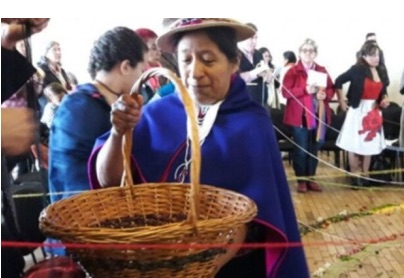. . WOMEN’S EQUALITY . .
An article from FILAC – The Fund for the Development of the Indigenous Peoples of Latin America and the Caribbean
Seeking greater political participation and with the intention of working for peace, especially in their community, but also in the country, the indigenous women of Colombia have created a Council of Women for Peace.

(Click on photo to enlarge)
In Colombia, women belonging to the indigenous peoples of the region consider that they have had to face “armed conflict, psychological violence” and even “conflicts in their home”, according to Margarita Rodríguez, an indigenous representative.
The council in question was presented along with appropriate rituals and the name Conamic, National Council of Women of Colombia. The group includes representatives of the 10 Colombian indigenous peoples and will immerse itself in the world of politics with the intention of generating peace.
(Article continued in the right column)
Do women have a special role to play in the peace movement?
(Article continued from the left column)
In Colombia there are more than two million indigenous people belonging to 102 villages, according to the National Indigenous Organization of Colombia, known by its acronym ONIC.
Margarita belongs to the Sikuani people. During the meeting in which they made the council official, she revealed that they have been meeting since 2013 and emphasized that it is not a last minute decision, but something that they have been working for and thinking about for some time.
Nasa, Pasto, Tanacona, Sikuani, Misak, Emberá, Wayú, Arhuaco, Pijao and Yeral are the names of the ten peoples that make up this council of Colombian indigenous women.
For them, the participation and empowerment of women is important, considering the violent situations in which they have been involved, and especially if it is about achieving peace, said Ivonne González, director of human rights at the Ministry of Interior. She added that “having a group of indigenous women today is fundamental because the activism of women was what led to a gender subcommittee in the Havana agreements.”
For her part, a council representative present at the Conamic initiation ritual said that “respect for the life, integrity and security of all women is a fundamental duty of the country. We do not want women killed in our territories or outside them.”